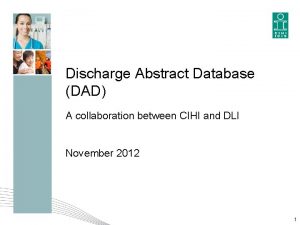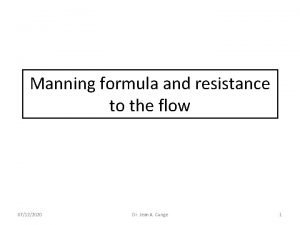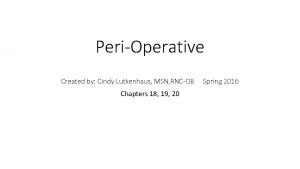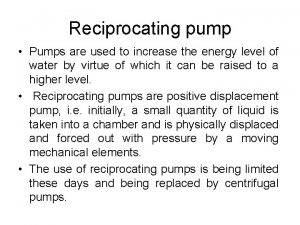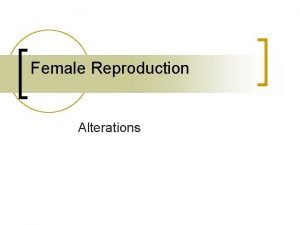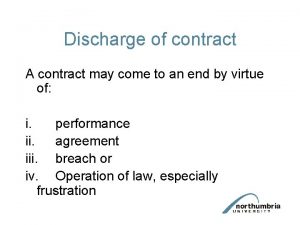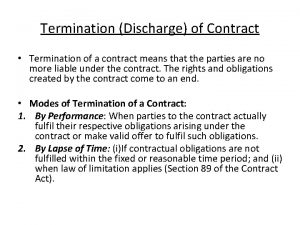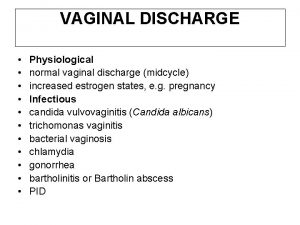DISCHARGE OF A CONTRACT DISCHARGE OF A CONTRACT























- Slides: 23

DISCHARGE OF A CONTRACT

DISCHARGE OF A CONTRACT DISCHARGE BY PERFORMANCE DISCHARGE BY AGREEMENT OR CONSENT DISCHARGE BY IMPOSSIBILITY OF PERFORMANCE DISCHARGE BY LAPSE OF TIME DISCHARGE BY OPERATION OF LAW DISHARGE BY BREACH OF CONTRACT

DISCHARGE BY PERFORMANCE ACTUAL PERFORMANCE When both parties perform their promises & there is nothing remaining to perform ATTEMPTED PERFORMANCE When the promisor offers to perform his obligation , but promisee refuses to accept the performance. It is also known as tender

DISCHARGE BY AGREEMENT OR CONSENT w NOVATION (Sec 62): New contract substituted for old contract with the same or different parties w RESCISSION (Sec 62) : When some or all terms of a contract are cancelled w ALTERATION (Sec 62): When one or more terms of w a contract is/are altered by the mutual consent of the parties to the contract w REMISSION (Sec 63) : Acceptance of a lesser fulfilment of the promise made. w WAIVER : Mutual abandonment of the right by the parties to contract w MERGER : When an inferior right accruing to a party to contract merges into a superior right accruing to the same party

DISCHARGE BY IMPOSSIBILITY OF PERFORMANCE w w KNOWN TO PARTIES UNKNOWN TO PARTIES SUBSEQUENT IMPOSSIBILITY SUPERVENNING IMPOSSIBILITY (Sec 56) Destruction of subject matter Non-existance of state of things Death or incapacity of personal services Change of law Outbreak of war

DISCHARGE BY LAPSE OF TIME w THE LIMITATION ACT 1963, CLEARLY STATES THAT A CONTRACT SHOULD BE PERFORMED WITHIN A SPECIFIED TIME CALLED PERIOD OF LIMITATION w IF IT IS NOT PERFORMED AND IF THE PROMISEE TAKES NO ACTION WITHIN THE LIMITATION TIME, THEN HE IS DEPRIVED OF HIS REMEDY AT LAW

DISCHARGE BY OPERATION OF LAW v DEATH v MERGER v INSOLVENCY v UNAUTHORISED ALTERATION OF THE TERMS OF A WRITTEN AGREEMENT v RIGHTS & LIABILITIES VESTING IN THE SAME PERSON

DISCHARGE BY BREACH OF CONTRACT v ACTUAL BREACH : § At the time of performance § During the performance v ANTICIPATORY BREACH § By the act of promisor (implied repudation) § By renunciation of obligation (express repudation)

REMEDIES FOR BREACH OF CONTRACT

REMEDIES OF INJURED PARTY w A remedy is a means given by law for the enforcement of a right w Following are the remedies w [1] Rescission of damages. w [2] Suit upon quantum meruit. w [3] Suit for specific performance. w [4] Suit for injunction.

RESCISSION When a contract is broken by one party, the other party may sue to treat the contract as rescinded and refuse further performance. In such a case, he is absolved of all his obligations under the contract. The court may give rescission due to 1)contract is voidable. 2)contract is unlawful The court may refuse to rescind if 1)Plaintiff has ratified the contract. 2)Parties cannot be restored to the original position. 3)The third party has acquired for value. 4)When only a part is sought to be rescinded. (sec 27 of specific relief act 1937)

DAMAGES Damages are a monetary compensation allowed to the injured party by the court for the loss or injury suffered by him by the breech of the contract. The objective of awarding damages for the breech of contract is to put the injured party in the same position as if he had not been injured. This is called the doctrine of restitution. The fundamental basis is awarding damages for the pecuniary loss.

QUANTUM MERUIT The phrase quantum meruit literally means ‘as much as earned’. A right to sue on a quantum meruit arises when a contract, partly performed by one party, has been discharged by breach of contract by the other party. This right is performed not on original contract but on implied promise by other party for what has been done.

SPECIFIC PERFORMANCE w In certain cases of breach of contract damages are not an adequate remedy. The court may, in such cases, direct the party in breach to carry out his promise according to terms of the contract. This is a direction by the court for specific performance of the contract at the suit of the party not in breach w Cases for specific performance to be enforced w 1)when the act agreed to be done is such that compensation is not adequate relief. w 2)when there is no standard for ascertaining the actual damage w 3)when it is probable that compensation cannot

INJUNCTION When a party is in breech of a negative term of contract the court may, by issuing an order, restrain him by doing what he promised him not to do. Such an order of the court is called injunction Court refuses grant of injunction [1] whereby a promisor undertakes not to do something [2] which is negative in substance though not in form

INDEMNITY

INDEMNITY (Sec 124) A CONTRACT BY WHICH ONE PARTY PROMISES TO ANOTHERR TO SAVE HIM FROM LOSS CAUSED TO HIM BY THE CONDUCT OF THE PROMISOR HIMSELF , OR BY THE CONDUCT OF ANY OTHER PERSON IS CALLED A CONTRACT OF INDEMNITY

ESSENTIAL FEATURES OF INDEMNITY ü There are two persons , the indemnifier the indemnified or the indemnity holder ü There must be loss either by the promisor’s conduct or by any other person’s conduct ü It is a contingent contract by nature ü It may be express or implied Sec 125 deals with the commencement of the indemnifier’s liability. His liability commences when the event causing the loss occurs or when the event saving the indemnified from the loss becomes impossible

GUARANTEE

GUARANTEE (Sec 126) A CONTRACT OF GUARANTEE IS A CONTRACT TO PERFORM THE PROMISE, OR DISCHARGE THE LIABILITY, OF A THIRD PERSON IN CASE OF HIS DEFAULT. THE PERSON WHO GIVES THE GUARANTEE IS KNOWN AS THE ‘SURETY’, THE PERSON IN RESPECT OF WHOM THE GUARANTEE IS GIVEN IS KNOWN AS THE ‘PRINCIPAL DEBTOR’, AND THE PERSON TO WHOM THE GUARANTEE IS GIVEN IS CALLED THE ‘CREDITOR’. A GUARANTEE MAY BE EITHER ORAL OR WRITTEN.

ESSENTIAL FEATURES OF GUARANTEE w Concurrence of three contracts w Primary liability is that of the principal debtor w In case the debtor is a minor , the surety’s liability becomes primary w All the essentials of a valid contract w It may be in writing or oral w There need not be full disclosure of facts to the surety before he gives the guarantee

TYPES OF GUARANTEE w SPECIFIC GUARANTEE : When a guarantee extends to a single transaction or debt it is known as a specific or simple guarantee CONTINUING GUARANTEE : When a guarantee extends to a series of transactions It is called continuing guarantee

THANK YOU
 5 step model ifrs 15
5 step model ifrs 15 Contingent contract and wagering agreement
Contingent contract and wagering agreement Discharge abstract database
Discharge abstract database Anthozoa
Anthozoa Chapter 11 admission transfer and discharge
Chapter 11 admission transfer and discharge Esd awareness training
Esd awareness training White clumpy discharge after using metronidazole gel
White clumpy discharge after using metronidazole gel Yellow cottage cheese discharge
Yellow cottage cheese discharge Chapter 14 discharge
Chapter 14 discharge Discharge pathways
Discharge pathways Aldrete scoring
Aldrete scoring Design discharge for bridge
Design discharge for bridge Reva rubin
Reva rubin Streptococcus pneumoniae csf
Streptococcus pneumoniae csf Manning's equation
Manning's equation Modified aldrete score
Modified aldrete score Erythomatous
Erythomatous What is a river discharge
What is a river discharge 996423
996423 Std white discharge
Std white discharge The discharge through a single acting reciprocating pump is
The discharge through a single acting reciprocating pump is Leiomyomas
Leiomyomas Mental health discharge planning checklist
Mental health discharge planning checklist A very dramatic electric discharge
A very dramatic electric discharge


